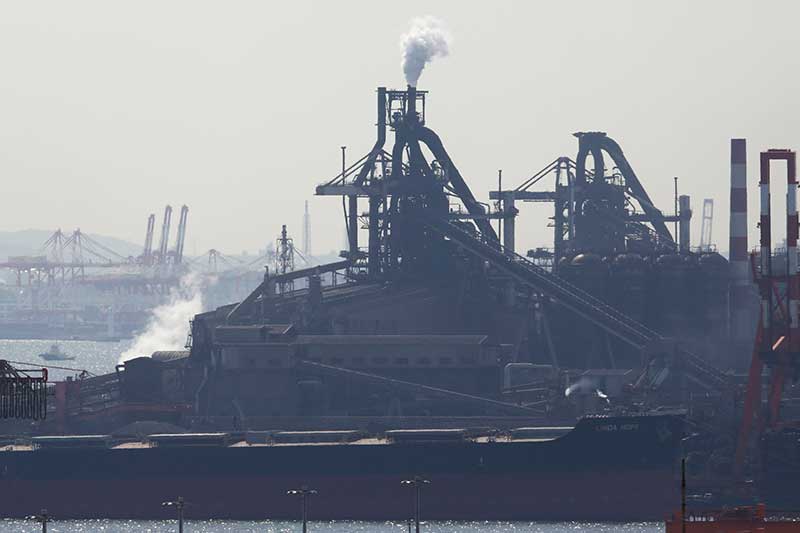China weighs whether to retaliate over Trump's tariff hikes

The factory of JFE Steel Corporation is seen in Kawasaki near Tokyo, Friday, March 2, 2018. President Donald Trump says he will impose steep tariffs on steel and aluminum imports. His Thursday commentes are escalating tensions with China and other U.S. trading partners and raising the prospect of higher prices for American consumers and companies. Trump's announcement caught some Republican allies off-guard and capped an intense internal White House debate. It also roiled financial markets. AP/Koji Sasahara
BEIJING — After threatening to retaliate if President Donald Trump raised trade barriers, Chinese leaders need to decide whether his hikes in steel and aluminum tariffs justify starting a fight that might disrupt access to one of China's biggest markets.
Beijing had no immediate reaction Friday to Trump's plan for tariffs of 25 percent on steel and 10 percent on aluminum. Asian stock markets fell amid talk of a "trade war.".
Chinese leaders need to weigh the need to back up threats with action against the risk of disrupting U.S. market access for smartphones and other exports that matter more to the economy than metals.
"China will definitely respond. It doesn't want to be seen as weak. But it will be relatively restrained," said economist Louis Kuijs of Oxford Economics. "They don't want to be seen as a party that is wrecking the international trading system."
Beijing has accused Trump of undermining global trade regulation by taking action over steel, technology policy and other disputes under U.S. law instead of through the World Trade Organization.
Chinese officials have appealed to the White House since last March to avoid hurting both sides by disrupting aluminum trade. Their tone hardened after Trump launched a probe in August of whether Beijing improperly pressures companies to hand over technology and in January raised duties on Chinese solar modules and washing machines.
"China will take necessary measures to defend its interests," said a Commerce Ministry official, Wang Hejun, in a statement this week.
Japan and South Korea, both U.S. allies and major exporters of steel and aluminum, said they would ask for exemptions from the tariff hike, which Trump justified in part on national security grounds.
"We don't think imports from Japan, an ally, have any effect at all on U.S. national security," said Japan's trade and industry minister, Hiroshige Seko, at a news conference.
A South Korean trade envoy, Kim Hyun-chong, met with Trump's chief economic adviser, Gary Cohn, and Commerce Secretary Wilbur Ross to "strongly demand" they keep the impact on South Korean companies to a minimum, according to a trade ministry statement.
The president of the European Union's governing body, Jean-Claude Juncker, said the 28-nation trade bloc will retaliate if Trump follows through.
"Risks of trade wars are rising, but should be contained for now," said Cesar Rojas and Ebrahim Rahbari of Citigroup in a report. "We expect U.S. major trade partners' reaction to be moderate, including by taking cases to the WTO."
Adding to the political stakes in China, Trump's announcement came ahead of next week's meeting of its ceremonial legislature, the year's most prominent political event. Action against American companies or goods would compete for attention with the National People's Congress, which the ruling Communist Party uses to showcase its economic plans.
Beijing has an array of high-profile targets for retaliation including suppliers of soybeans, the biggest American export to China. A curb on purchases could hurt farm state voters who supported Trump.
"We've clearly heard from the Chinese" that soybeans "are definitely one of the largest things that could be targeted," said Jake Parker, vice president for China operations for the U.S.-China Business Council.
However, Parker said, soybeans might be held for use later on a bigger issue such as the "301" investigation into Beijing's technology policy, which could have a broader impact.
Trade makes up a smaller share of China's economy than it did a decade ago. But export-driven industries support millions of jobs, raising the potential political cost of any disruption.
The United States, China's No. 2 trade partner after the EU, buys about 20 percent of Chinese exports but allows Beijing to run multibillion-dollar surpluses that offset its deficits with other partners.
Last year, China exported goods worth $2.80 to the United States for every $1 of American goods it bought, according to Chinese data. Its trade surplus of $275.8 billion with the United States was equal to 65 percent of its global total.
"That makes China the more vulnerable partner in this," said Kuijs.
Also Friday, the Commerce Ministry expressed "grave concern" about a trade policy report sent to the U.S. Congress by the White House this week that accuses China of moving away from market principles. It pledges to prevent Beijing from disrupting global trade.
The ministry said Beijing has satisfied its trade obligations and appealed to Washington to settle market access and subsidy disputes through negotiation.
___
AP Writers Gerry Shih in Beijing, Tong-hyung Kim in Seoul, South Korea, and Mari Yamaguchi in Tokyo contributed.
- Latest
- Trending

























